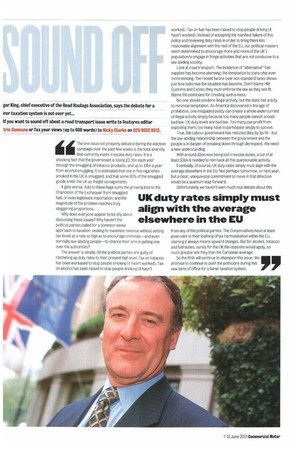ger King, chief executive of the Road Haulage Association, says
Page 46

If you've noticed an error in this article please click here to report it so we can fix it.
the debate for a irer taxation system is not over yet.
If you want to sound off about a road transport issue write to features editor Inc Cunnane or fax your views (up to 600 words) to Nicky Clarke on 020 8652 8912.
dd The one issue not properly debated during the election
campaign over the past few weeks is the total anarchy that currently exists in excise duty rates. it is a shocking fact that the government is losing £2.5bn each year through the smuggling of tobacco products, and up to Elbri a year from alcohol smuggling. It is estimated that one in five cigarettes smoked in the UK is smuggled, and that some 80% of the smuggled goods enter the UK as freight consignments.
It gets worse. Add to these huge sums the growing loss to the Chancellor of the Exchequer from smuggled fuel, or even legitimate importation, and the magnitude of the problem reaches truly staggering proportions.
Why does everyone appear to be shy about discussing these issuesP Why haven't the poktical parties called for a common-sense approach to taxation, seeking to maximise revenue without setting tax levels at a rate so high as to encourage criminals—and even normally law-abiding people—to chance their arm in getting one over the authorities?
The answer is simple. All the political parties are guilty of ratcheting up duty rates to their present high level. Tax on tobacco has been increased to stop people smoking (it hasn't worked). Tax on alcohol has been raised to stop people drinking (it hasn't worked). Tax on fuel has been raised to stop people driving (it hasn't worked). Instead of accepting the manifest failure of this policy and reviewing duty rates in order to bring them into reasonable alignment with the rest of the EU, our political masters seem determined to encourage more and more of the UK's population to engage in fringe activities that are not conducive to a law abiding society.
Look at road transport. The incidence of 'alternative" fuel supplies has become alarming; the temptation to trans-ship ever more enticing. The recent furore over non-standard tanks shows just how ludicrous the situation has become. Don't blame HM Customs and Excise; they must enforce the law as they see fit. Blame the politicians for creating such a mess.
No-one should condone illegal activity, but the state has a duty to minimise temptation. As America discovered in the age of prohibition, one misguided policy can create a whole undercurrent of illegal activity simply because too many people cannot accept bad law. UK duty levels are bad law. Too many can profit from exploiting them; too many have to participate simply to survive.
True, the Labour government has reduced duty by 3p/lit—but the law-abiding relationship between the government and the people is in danger of breaking down through disrespect. We need a new understanding.
With around £5bn now being lost in excise duties, a cut of at least £3bn is needed to rein back all this questionable activity.
Eventually, of course, UK duty rates simply must align with the average elsewhere in the EU. Not perhaps tomorrow, or next year, but a clear, unequivocal commitment to move in that direction would be a quantum leap forward.
Unfortunately we haven't seen much real debate about this from any of the political parties. The Conservatives have at least given vent to their loathing of tax harmonisation within the EU, claiming it always means upward changes. But for alcohol, tobacco and fuel duties, surely for the UK the opposite would apply, so much greater are they than the European average.
So the RHA will continue to champion this issue. We promise to continue to push the politicians during this new term of office for a fairer taxation system.




































































































